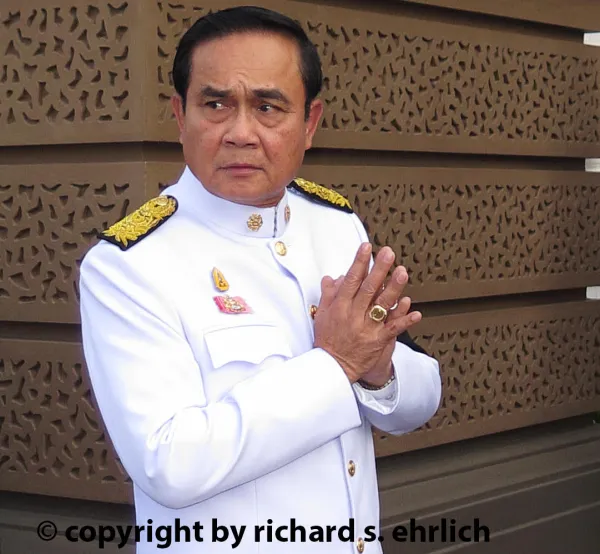BANGKOK, Thailand -- A Constitutional Court suspended Prime Minister Prayuth Chan-ocha from office on August 24, immediately replacing him with his deputy, while judges decide when Mr. Prayuth's prime ministry should end after he seized power in a 2014 coup and won a 2019 election.
The new Acting Prime Minister Prawit Wongsuwon, 77, was expected to continue Mr. Prayuth's domestic policies and announce no major changes in international relations.
Mr. Prawit was a former army chief and is an influential political manipulator among conservatives.
He was senior among six deputy prime ministers, and had participated in Mr. Prayuth's coup.
It was not known when the Constitutional Court would issue a final and binding ruling on the opposition's petition which seeks to oust Mr. Prayuth and stage fresh elections.
Mr. Prayuth's opponents say his term as prime minister legally expired on August 24 -- eight years after his August 24, 2014 military coup which toppled an elected civilian government when Mr. Prayuth was army chief.
That junta had named Mr. Prayuth unelected prime minister in 2014 when he retired as army chief.
In 2017, he orchestrated a new constitution limiting a prime minister's term to four years, with a total eight years if re-elected.
His opponents insist he has now ruled as a prime minister for eight years -- unelected plus elected.
But his supporters insist he should remain as prime minister because his time as a civilian in that office began in 2019 when his coalition won a parliamentary election.
Parliament then elected him for his current four-year term as prime minister, and scheduled the next election for May 2023.
On August 24, the Constitutional Court voted 5-4 to suspend Mr. Prayuth's prime ministry while judges decide on the petition which was submitted by 171 opposition parliament members asking the court to rule on the dates.
"Prayuth can still carry on as defense minister, a portfolio he holds concurrently," another deputy prime minister, Wissanu Kreangam, told reporters.
As defense minister, Mr. Prayuth can attend cabinet meetings and other official functions.
Mr. Prayuth has 15 days to respond to the decision. He earlier indicated he would comply with the court.
"Prime Minister Prayuth also urged the people to respect the decision of the court and avoid criticizing the decision," said government spokesman Anucha Burapachaisri.
During Mr. Prayuth's eight years in power, he curbed free speech, political dissent, civilian trials and other basic rights.
He also voiced menacing threats against journalists, staged embarrassing temper tantrums, allowed opponents to be jailed, and presented himself as a humble altruist.
Washington's relations with Mr. Prayuth started cold, with then-President Obama's administration criticizing the coup for destroying Thailand's democracy.
Links improved when then-President Trump met Mr. Prayuth in the Oval Office in 2017.
Relations continued to tighten during President Biden's term -- especially the Pentagon's support.
Thailand is a non-NATO ally which the U.S. hopes will not side with China, its close neighbor, if a U.S.-China conflict erupts over Taiwan's status.
Mr. Prayuth appears to have balanced Bangkok's relations with Washington and Beijing, though some analysts say Thailand's tilt has been more welcoming to China in recent years.
The Constitutional Court had been criticized for allegedly favoring Mr. Prayuth on previous issues.
In January 2020, the Constitutional Court dissolved the Future Forward Party (FFP), which was emerging as Mr. Prayuth's most powerful parliamentary enemy.
The court said FFP's leader Thanathorn Juangroongruangkit violated election laws.
Mr. Thanathorn and his FFP lost their 80 seats in parliament.
Opposition parties' candidates may face difficulty if the court decides in Mr. Prayuth's favor, restores him to the prime ministry, and allows him to run for re-election.
But if the petition ousts Mr. Prayuth, the opposition may push for an amnesty to allow the return of two fugitive former prime ministers, Thaksin Shinawatra and his sister Yingluck Shinawatra, who are dodging corruption convictions.
Mr. Thaksin was elected in February 2001 and toppled in a September 2006 military coup.
Ms. Yingluck and her coalition won a July 2011 election.
The Constitutional Court terminated her government on May 7, 2014 shortly after Mr. Prayuth's coup.
Mr. Thaksin's Pheu Thai -- "For Thais" -- party now hopes his politically inexperienced daughter Paetongtarn Shinawatra will lead the opposition.
Alternatively, Mr. Prayuth's supporters among the military, royalists, middle class, and businesses may continue to dominate this Southeast Asian nation with other candidates similar to Mr. Prayuth but more dynamic.
Mr. Prayuth's 2019 election was boosted by his junta-appointed 250-seat Senate, while opposition parties could sit only in the 500-seat House of Representatives.
Adding to his reliable 250 Senate votes, Mr. Prayuth's Palang Pracharat party-led coalition needed only 126 House seats to achieve a 376 majority and be elected prime minister.
The opposition was unable to win 376 votes entirely from the House, and denounced the Senate as pro-Prayuth.
***
Richard S. Ehrlich is a Bangkok-based American foreign correspondent reporting from Asia since 1978. Excerpts from his two new nonfiction books, "Rituals. Killers. Wars. & Sex. -- Tibet, India, Nepal, Laos, Vietnam, Afghanistan, Sri Lanka & New York" and "Apocalyptic Tribes, Smugglers & Freaks" are available at
https://asia-correspondent.tumblr.com



